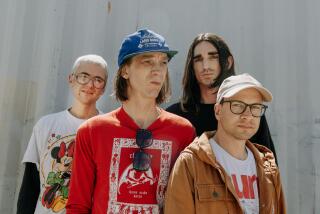With new album, Devo looks beyond its devoted following
The scene was as strange and comic as ever, as five men in matching gray, reflective uniforms wandered an outdoor stage in Hollywood, wearing hard plastic masks for reasons unknown. “Who are these masked men?” asked Gerald Casale, leaning over his keyboard to observe his fellow travelers in Devo and joke about their newest headgear. “It doesn’t impair your vision at all. It does affect brain function.”
The band was warming up for the night’s “Jimmy Kimmel Live” broadcast, doing one more run-through of “Fresh,” a song from Devo’s first new album in 20 years. The network TV gig would be part of a new reeducation and marketing plan, reintroducing this brotherhood first hatched decades ago in Akron, Ohio, amid provocative, crackpot theories on the decay and de-evolution of modern man, all set to anxious keyboards and electric guitar.
At center stage stood Mark Mothersbaugh, wearing glasses over his mask, singing breathlessly as he chopped at the air with his free hand: “I see a fork in the road, where it goes I don’t know / I won’t even think twice, I really don’t have a choice.”
The song was upbeat, catchy, with the usual unsettling undertones about life’s misadventures, and it was already market-tested through surveys and focus groups, weeks ahead of Tuesday’s release of the album, “Something for Everybody.” Devo aims to please in 2010, anxious to reach beyond its devoted cult and embrace the whims and wisdom of mainstream consumers.
“How are we going to reintroduce ourselves to a crowd of 20- and 30-year-olds who hear too much and don’t want to pay for anything anyway?” Casale wondered backstage. “It’s marketing, it’s all marketing.”
The new album collected a creative team of forward-looking pop producers, including the Teddybears, Greg Kurstin, Dust Brother John King and the duo of John Hill and Santi White (a.k.a. Santigold). They delivered a dozen festive tracks of danceable synth-rock and robot R&B.
“There’s this new generation of kids that have grown up with Devo or know of Devo from the past, and it’s not something bewildering,” said Mothersbaugh. “Why not let them take a shot at producing Devo, possibly the way we rearranged ‘Satisfaction’ by the Rolling Stones 10 years after it had been written. “
To sell “Something for Everybody,” Devo reunited with Warner Bros. Records and aligned with Mother, an international advertising agency with experience marketing the likes of Coca-Cola, New Balance and Johnson & Johnson. The goal was to promote a rock album with the same business acumen that a major corporation might use to test and sell a bar of soap.
Devo first signed with Warner Bros. in 1978, and major labels remain the best route to radio airplay and distribution, said Mothersbaugh, “but as far as marketing, we were never really impressed with anything that ever happened. Nobody ever took advantage of it. From the get-go we were looking for an ad agency.”
Weeks after the Kimmel show, the two Devo frontmen sat together in the main studio of Mutato Muzika, the company Mothersbaugh calls his “day job,” where he and other members of Devo create original music for film, television and advertising, from the former series “Rugrats” to the movies of Wes Anderson. For more than a decade, it’s been housed in a conspicuous, forum-shaped building painted fluorescent green on the Sunset Strip.
“Something for Everybody” was largely recorded at Mutato, designed to begin Devo’s escape from “the cocoon and state of suspended animation,” said Casale, now out of uniform and dressed at Mutato in a black suit. “It was now or never. The world is more devolved than ever.”
Public consumption of that concept began with the band’s classic 1978 debut, “Q: Are We Not Men? A: We Are Devo!,” a twitchy manifesto that was anti-rock and anti-cool, a multimedia sendup of conformity, technology, religion and sex.
The themes haven’t changed much through the years, and the commercial imperative was often center stage. Devo introduced a “corporate anthem” and embraced merchandising without hesitation, selling not only T-shirts but Devo’s yellow hazmat jumpsuits and their iconic red “energy dome” helmets. By 1984, the band was in commercials for Honda scooters.
For the new album, some decisions previously made instinctively by the band were now left to the whims of the voting public. In the months preceding the album release, Mother conducted surveys online and in controlled environments on songs, color, touch — each shaping the coming Devo campaign.
As with everything Devo, the project was both serious and satirical, using the marketing as a central part of the message and the joke, videotaping focus groups conducted by a young, accented Nordic man named “Jacob.”
Most important, fans were allowed to sample Devo’s new songs online and choose their favorites from a total of 16. The winning 12 for the final album were announced via streaming video at ClubDevo.com, but soon the words “88 percent focus group approved” appeared, acknowledging a certain corporate interference with pure populism.
“We definitely chimed in about which songs we felt needed to be on the record, despite what the world said,” said Bill Moulton, creative director for the Mother campaign. “It probably rubbed some fans the wrong way, but we hope they understand when you’re playing in the devolved world and you’re playing with corporate partners, there are some sacrifices.”
Casale and Mothersbaugh grew up in Ohio while absorbing an endless supply of pop culture kitsch, B-movies and TV commercials, comic books and cocktail napkin cartoons, before meeting as art students at Kent State University. Devo emerged in the aftermath of horror and disbelief at the 1970 killing of four students there by Ohio National Guardsmen during a campus antiwar protest.
They turned anger into creativity, piecing together a new sound and the half-serious, half-comic de-evolution philosophy. They recruited younger brothers Bob Mothersbaugh (“Bob 1”) and Bob Casale (“Bob 2”) on guitars and got serious.
Much of Devo’s history since then was instigated in Los Angeles, beginning first at a 1977 showcase at the Starwood. Devo decided to stay, becoming a regular on the erupting punk rock scene.The sounds the band made then and after both rocked and anticipated the coming electronic revolution in pop. The music industry has changed much since then, devolving in its own way, but Devo somehow survives, still hungry to attempt new ideas and connections.
“There has been an implosion of the old way of doing things,” said Casale, “but the new one hasn’t really worked out yet. So we’re in the experimental phase.”
More to Read
The biggest entertainment stories
Get our big stories about Hollywood, film, television, music, arts, culture and more right in your inbox as soon as they publish.
You may occasionally receive promotional content from the Los Angeles Times.











